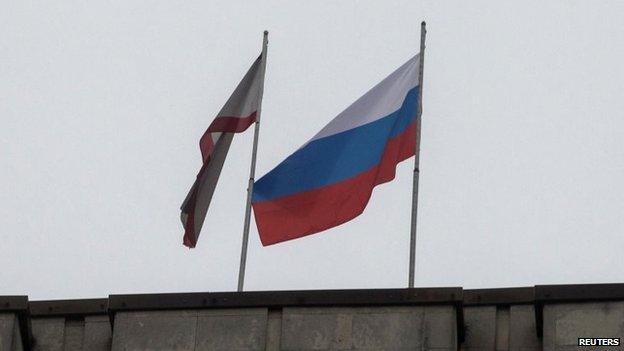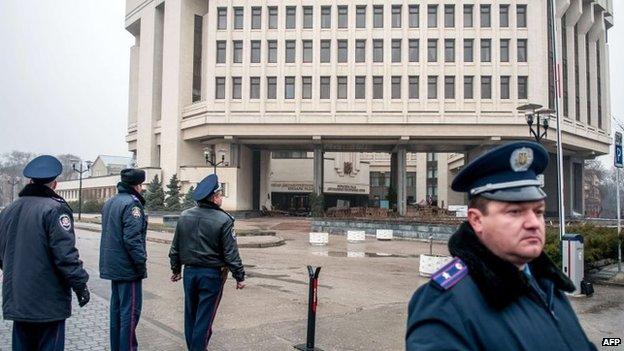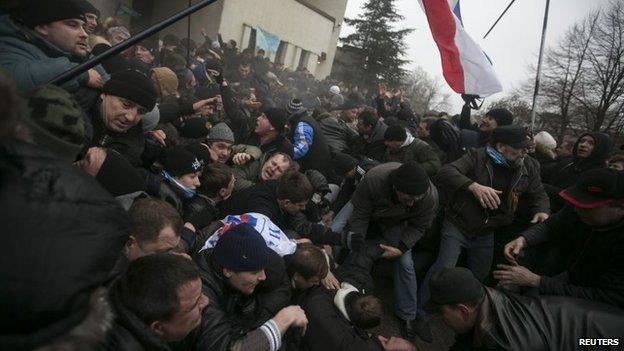Ukraine: Gunmen seize Crimea government buildings
- Published
The BBC's Mark Lowen reports on the armed stand-off in Simferopol
Ukraine's security forces have cordoned off two government buildings seized by armed men in Simferopol, the capital of the Russian-majority region of Crimea.
The Russian flag had been raised over both the parliament and the regional government buildings in Simferopol.
On Wednesday pro-Russian separatists and supporters of Ukraine's new leaders confronted each other in the city.
Ukrainian interim President Olexander Turchynov warned Russia against any "military aggression" in Crimea.
He said Russia's troops from Russia's Black Sea Fleet should not move outside their naval base in the Crimea.
"I would like to call on the leadership of the Russian Federation to respect the basic agreements on the Russian military presence in the Autonomous Republic of Crimea," Mr Turchynov.
Meanwhile Russia is performing a second day of military exercises, saying it fighter jets were on "combat alert".
"Constant air patrols are being carried out by fighter jets in the border regions," Russia's defence ministry told Interfax.
On Wednesday, President Vladimir Putin ordered a snap drill to test the combat readiness of troops in central and western Russia, near the border with Ukraine. Thursday's exercises appear to be part of that drill, analysts say.

The Russian flag flew over Simferopol's parliament building on Thursday morning

Police were deployed around the building

On Wednesday there were clashes between pro- and anti-Russian protesters in Simferopol
Also on Thursday, the Russian foreign ministry expressed concern, external over what it termed "massive violations of human rights in Ukraine".
Amid heightened tensions between Russia and the West, Nato has issued a statement saying it would continue to support Ukraine's territorial integrity.
The US has warned against any military intervention by Russia.
'Provocateurs'
The incident in Simferopol is another illustration of tensions in the region, says the BBC's Mark Lowen in Crimea.
On Wednesday the city saw clashes erupt between Ukrainians who support the change of government and pro-Russians.
Ukrainian Interior Minister Arsen Avakov said the area near the government buildings has been cordoned off to prevent "bloodshed". He added that the seizure of the buildings was the work of "provocateurs".
"Measures have been taken to counter extremist actions and not allow the situation to escalate into an armed confrontation in the centre of the city," he said in a statement on his Facebook page.
Regional Prime Minister Anatoliy Mohylyov told a local TV station said he would take part in talks with the gunmen and told government employees who normally work there not to come in.
The men have not yet made any demands or issued any statements but did put up a sign reading: "Crimea is Russia".
They threw a flash grenade in response to questions from a journalist, AP news agency reported.
Separatism fears
Tensions have been rising in Crimea since President Viktor Yanukovych was ousted last week.
Crimea - where ethnic Russians are in a majority - was transferred from Russia to Ukraine in 1954.
Ethnic Ukrainians loyal to Kiev and Muslim Tatars - whose animus towards Russia stretches back to Stalin's deportations during World War II - have formed an alliance to oppose any move back towards Moscow.
On Wednesday Prime Minister designate Arseniy Yatsenyuk said: "In Crimea we always had different sentiments and forces who try to split the country and proclaim separatism."
But he told the BBC that Ukraine "could cope".
Crimea was transferred from Russia to Ukraine in 1954.
Russia, along with the US, UK and France, pledged to uphold the territorial integrity of Ukraine in a memorandum signed in 1994.